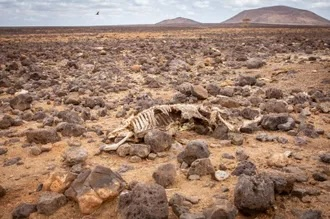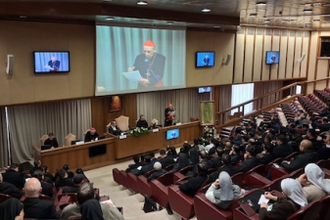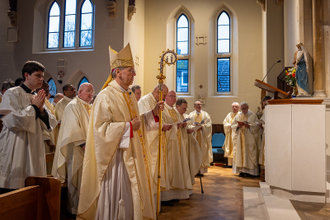New report shows people living in 10 most climate-vulnerable countries received less than $1 a year in climate finance

Empty livestock pens, livestock and camel carcasses caused by drought - Image: May 2022.
Source: Christian Aid
The ten countries most affected by climate change between 2000 and 2019 received less than 2% of all climate finance
Report finds that the 750 million people now living in the ten most climate-vulnerable countries received on average less than $1 each per year from rich countries.
Less than 50 cents in every $100 of all climate finance is private finance for adaptation, underlining the need for public grants. On Finance Day at COP29 Christian Aid is urging governments to pay for public, grant based finance through progressive taxes on major polluters e.g. fossil fuel companies.
As world leaders meet at COP29 in Azerbaijan, a new report by the international development agency Christian Aid has warned world leaders must stop "chasing shadows" with attempts to make up for insufficient and poor-quality public finance with private contributions.
The New Collective Quantified Goal (NCQG), the framework for mobilising finance to accelerate climate action in lower-income countries, is due to dominate the discussions amongst world leaders, earning COP29 its "Finance COP" title.
World leaders will be expected to replace the previous target agreed in Copenhagen in 2009 of $100 billion per year by 2020, which developed countries only met late in the form of loans rather than grants. Christian Aid says a new approach is needed to "rebuild trust and credibility."
The charity's new report: 'Putting our money where our mouth is: why we need public climate finance' concludes the assumption that the new finance goal will effectively be met by private finance is at odds with the evidence.
According to the report, much lower amounts of private climate finance flowed between countries than were hoped or expected. Under 3% of all climate finance (international and domestic) went to low-income countries in 2022, the latest year for which data is available.
The data also shows the ten countries most affected by climate change between 2000 and 2019 received just $23bn, less than 2% of all climate finance, despite accounting for 9% of the world's population. The 750 million people now living in these climate-vulnerable countries would have received on average less than $1 each a year from rich countries.
Christian Aid is urging richer countries to pay their fair share of public, grant based climate finance to developing countries through progressive international taxes on major polluters, not least fossil fuel companies.
Mariana Paoli, Global Advocacy Lead at Christian Aid, said: "The climate crisis is disproportionately affecting the world's poorest and most vulnerable communities, who contribute the least to its causes. These communities bear the brunt of climate-related disasters despite having by far the least capacity to adapt.
"If COP29 is going to live up to its 'Finance COP' title, world leaders must stop chasing shadows with attempts to make up for insufficient and poor-quality public finance with private contributions. We cannot continue the failures of the past; we must rebuild trust and credibility.
"The evidence is clear. Private finance, predicated on profit, doesn't reach poorer and climate vulnerable communities. Just 0.5% private finance goes to adaptation, a drop in the ocean. When $270bn is spend on fossil fuel subsidies, seven times what is spent on adaptation, it's a cruel joke.
"To meet the scale of the climate finance needed, and to avoid exacerbating the debt-crisis, we need more public finance through grants. Christian Aid is therefore calling for more progressive taxes on major polluters, not least fossil fuel companies. It can be done but it requires the political will."
Janine Felson, Ambassador of Belize to the United Nations, added: "The climate injustices are glaring. Belize and other vulnerable nations face outsized climate impacts with limited support, despite contributing minimally to the crisis. Who should bear the cost? Both law and ethics demand that polluters-not victims-pay. Yet Belize's experience shows that climate-vulnerable nations are left to shoulder the costs. At the upcoming summit in Baku, leaders must address this injustice.
"The New Collective Quantified Goal for climate finance must prioritise public, grant-based funding, particularly for adaptation and loss and damage, with specific provisions to ensure access for SIDS and Least Developed Countries."
The report can be accessed here: www.christianaid.org.uk/resources/our-work/putting-our-money-where-our-mouth


















